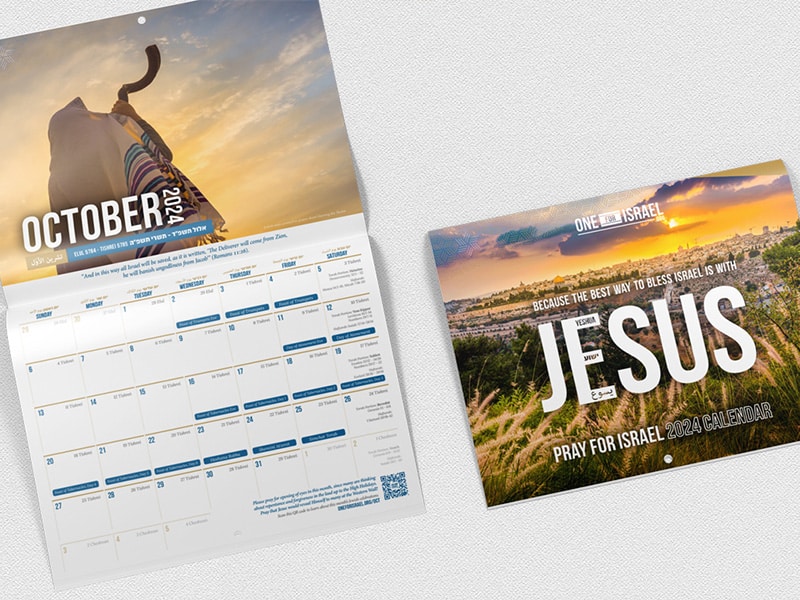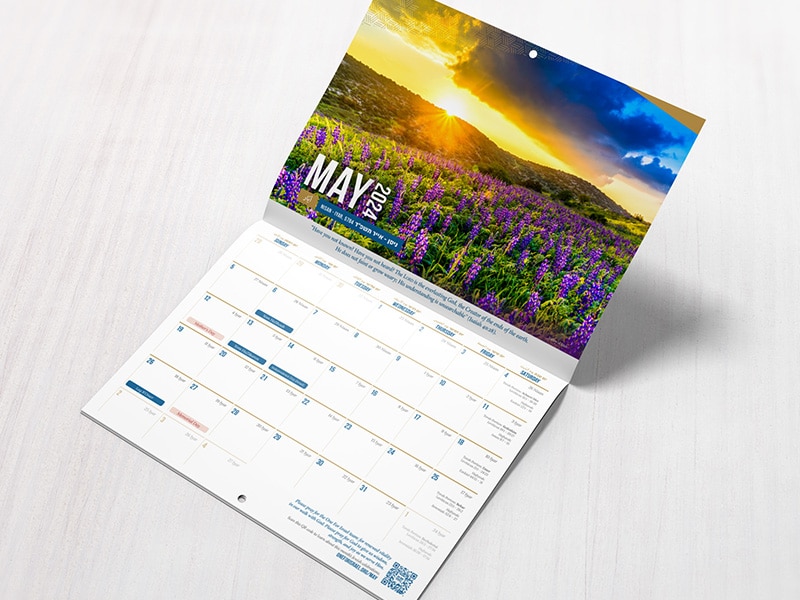On the first day of the Jewish month of Tishri in the Fall, the Feast of Trumpets blasts its way into the new Jewish year. Today it is known as Rosh Hashanah, the “Head of the Year”, even though it’s not really the start of the Biblical year at all, according to Exodus 12:2. The calendar year was supposed to start in the month of Passover in the spring, and the Feast of Trumpets comes at the beginning of the seventh month. Like all the other “Feasts of the Lord”, it is full of significance and meaning for us today, as well as prophetic meaning about what is to come.
There are three fall holidays which come in quick succession: the Feast of Trumpets, the Day of Atonement and the Feast of Tabernacles. The ten days between the Feast of Trumpets and Yom Kippur (the Day of Atonement, the holiest day of the Jewish calendar) are called the “Days of Awe”, where people are encouraged to contemplate their position before God, and it’s a very special time in Israel.
Just as the Spring feasts of Passover, Firstfruits and Shavuot (or Pentecost) are all prophetically related to the death, resurrection and ascension of Yeshua, and the sending of the Holy Spirit, the Fall feasts pertain to his second coming. The Feast of Trumpets relates to the last trumpet that shall sound when he comes again in glory.
“Behold! I tell you a mystery. We shall not all sleep, but we shall all be changed, in a moment, in the twinkling of an eye, at the last trumpet. For the trumpet will sound, and the dead will be raised imperishable, and we shall be changed. For this perishable body must put on the imperishable, and this mortal body must put on immortality. When the perishable puts on the imperishable, and the mortal puts on immortality, then shall come to pass the saying that is written:
“Death is swallowed up in victory.”
“O death, where is your victory? O death, where is your sting?”
The sting of death is sin, and the power of sin is the law. But thanks be to God, who gives us the victory through our Lord Jesus Christ.” (1 Corinthians 15:51-57)
Here’s what the Bible instructs about the Feast of Trumpets:
“And the Lord spoke to Moses, saying, “Speak to the people of Israel, saying, In the seventh month, on the first day of the month, you shall observe a day of solemn rest, a memorial proclaimed with blast of trumpets, a holy convocation. You shall not do any ordinary work, and you shall present a food offering to the Lord.”’ (Leviticus 23:23-25)
“On the first day of the seventh month you shall have a holy convocation. You shall not do any ordinary work. It is a day for you to blow the trumpets, and you shall offer a burnt offering, for a pleasing aroma to the Lord.” (Numbers 29:1-2)
It was intended by God to be a day of rest, a day to blow trumpets, and to offer sacrifices over and above the usual sacrifices for the new month for making atonement for the people.
What does blowing a trumpet mean?
Trumpets in Biblical times were either made from rams’ horns (shofars) or from silver, and could be blown by the priests and leaders. There were different sounds for different purposes:
– Time to pack up camp and move on, when the Israelites were traveling in the desert
– Time to gather the people and call an assembly
– To mark a sacrifice on a feast day
– A warning of war or danger
– To praise
– To declare a procession or feast
– Proclaiming a king
– Assembling the troops for battle
– To be used in battle
– To declare victory
It can be the sound of worship or a battle cry. A practical device for the twelve tribes on the march, and makers of special days and times of celebration.
The sound of the trumpet also has other connotations in the Bible:
– God’s power to raise the dead (1 Corinthians 15:52, 1 Thessalonians 4:16)
– The proclamation of the gospel (Psalms 89:15)
– The bold and faithful preaching of prophets (Isaiah 58:1, Hosea 8:1, Joel 2:1)
– The latter day judgments (Revelation 8:2 and 13)
Shana Tova! (Happy New Year!)
As we come into this new Jewish year, everyone will wish each other “Shana tova!” and that their name would be written in the Book of Life. It is customary to eat sweet foods like apples, honey and chocolate, and to give such gifts for a sweet new year. Modern Judaism has a concept of your good and bad deeds being weighed on the scales to see if you’re good enough to be written in the Book of LIfe at this time leading up to Yom Kippur, the Day of Atonement. I always tell people that I’m sure my name will be in there because I’m good friends with the author of the Book! The meaning of complete forgiveness and atonement for sin due the sacrifice a sinless other has been lost somewhere down the line. The trumpets signal the sacrifice for atonement which Yeshua fulfilled. They convey the preaching of the word and victory over death.
The sacrfice has been paid.
The battle has been won.
We can freely enter into his precious rest and feast with the God of Abraham, Isaac and Jacob.
Now that’s worth blowing a trumpet about.














